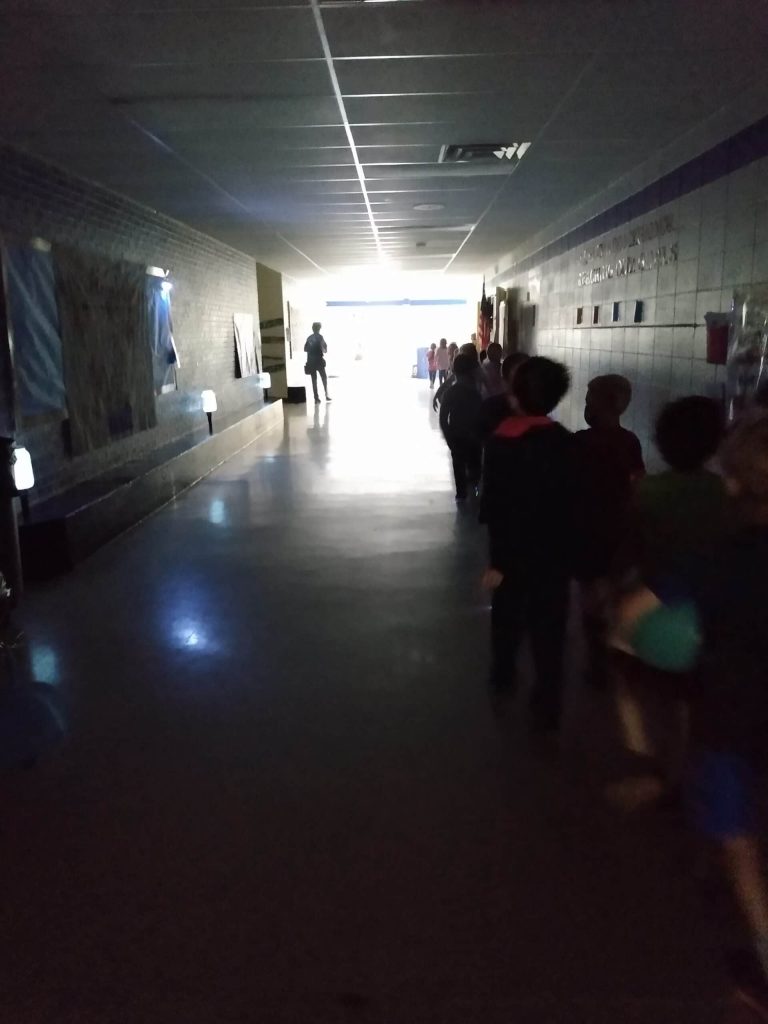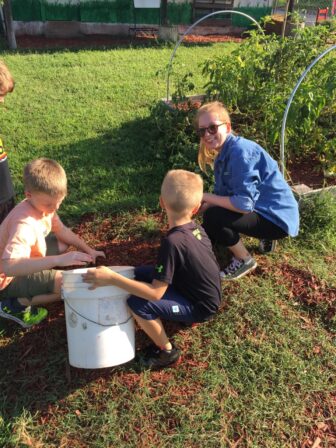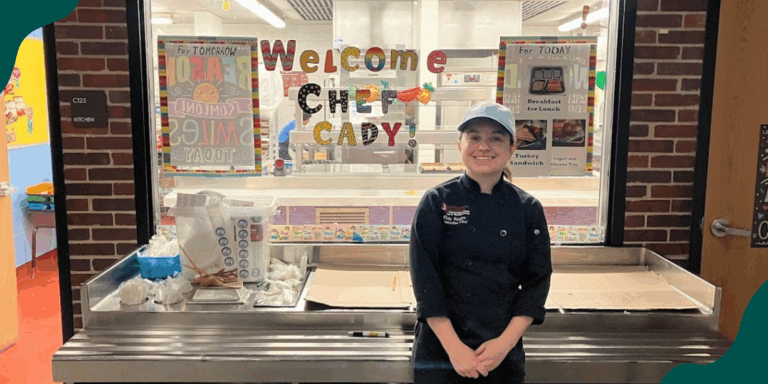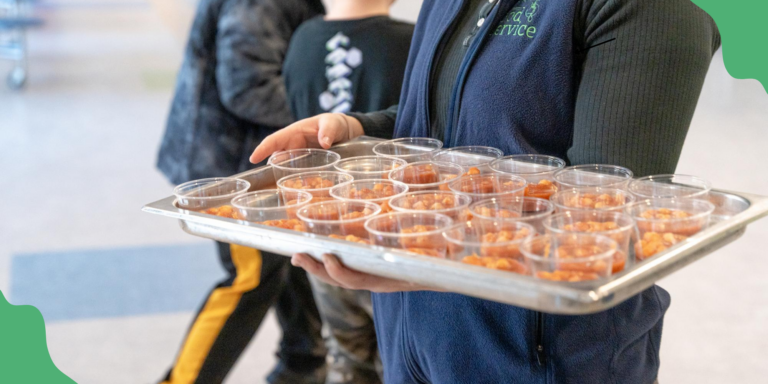Lights Out, Bellies Full
Tara McDaniel writes about the scramble to teach, feed, and support kids during a rare schoolwide blackout.
Tara McDaniel writes about the scramble to teach, feed, and support kids during a rare schoolwide blackout.

By Tara McDaniel, FoodCorps AmeriCorps Service Member ’21
Glow light bracelets flicker in the dark. There is a dull, blue illumination glowing in the school hallway from the makeshift lanterns constructed of standing flashlights. Above these sit empty plastic jars — the five-gallon jars once held dill pickles. Some of our students wear head lamps to track their way to the bathroom.
This is not a school sleepover event or a party day. We are completely out of power within the school building. Last night a huge storm came through the entire region around the rural community of Cedarville, Arkansas. A tornado briefly touched down about 20 miles away from the school. Fences, trees, and power lines are down throughout the area. Every school surrounding us is closed due to power loss. Although our main building is without electricity, our cafeteria has power. Within the cafeteria the lights are on and the kitchen is cooking. So our school doors are open today.
In fact, all of our doors leading outside are open because there is otherwise little light to safely travel down the halls. Some of our teachers have opted to use the cafeteria as their classroom, but we could hardly hold them all even if we didn’t have COVID guidelines to follow. Fourth grade English Language Arts is sitting outside under the awning listening to their teacher read. Many teachers grade papers next to the windows as their students use the same sunlight to practice their handwriting or work math problems. Our campus security guard moves around the small school with his eyes peeled. Inside our eyes adjust to the dark.
The decision to be open today despite the lack of electricity throughout the main building was heavily influenced by what our school provides its students. Of course, our main objective at the school is to teach students academically. That said, they are offered so much more on the school grounds. We have an on-site counselor to help with their emotional struggles. Thanks to our elementary school principal, the onsite Wellness Clinic offers healthcare to our students. It provides medical, dental, and eye care treatment. And then there are the very basic needs we provide for these kids. Our school offers 100% free breakfast, lunch, and dinner that meet National Breakfast and Lunch Program requirements. Simply put, if we were not open today some of these kids wouldn’t eat.
Cedarville is a town within rural Arkansas near the border of Oklahoma. It is a tight-knit community. The people within know their community’s strengths: charity, faith, and selfless service. Those same strengths help identify others within the community that may be experiencing hardships. Accessing nutritious foods is one of those hardships. For those students living in food insecure households, our cafeteria offers the mealtime table for each meal.
This town is impacted by profound barriers to healthy food access. We have a dollar store, a grocery store, and two gas stations leading out of town. Families that struggle with poverty often also struggle to maintain reliable transportation in order to get to the grocery store back to their homes. We do not have any sidewalks running adjacent to the highway that runs through the town. This makes travel by foot on the winding road at the foothill of the Boston Mountains a hike worthy of a backpacking trip. Parents rely on the free food services at the school as it solves these problems.
So we are open, without power, feeding children. It’s reminiscent of when we had staff preparing bagged meals that were delivered by school bus all spring after our state shut down schools. Our Nutrition Director — a firm woman who’s good with numbers and has a big momma bear heart — would put food in anyone’s empty hands. The students would go to their bus stops to pick up the bagged food, chat with the staff, and get any homework ready. Our school is a free summer lunch program site, so our buses continued to run breakfast and lunch all summer.
If there’s one silver lining to COVID closings, it’s that it gave school lunches a platform. It demonstrated to those who can eat at home that not everyone has the same resources. Like many other communities, Cedarville answered with a range of grassroots efforts to feed those who faced an empty dinner plate. The school became a hub through which food could be distributed by different means. Local churches handed out boxes of perishable food through car windows. The school offered pre-posted SNAP applications. Through social media, the school spread the word about emergency SNAP benefits offered by the state to the parents of school-age children in order to help offset the costs of putting food on the table.

Our school garden was open to one family at a time. Families were free to pick as much produce as they could eat. The garden always made available a first aid kit — including COVID PPE — gardening tools, and child and family activities. The space was left available as a connection to the school which so many students had otherwise lost. On the fence a sign was put up made out of plastic Solo cups that read “Keep Growing, Cedarville.”
I am the school’s FoodCorps AmeriCorps service member. I give hands-on lessons, support healthy school meals, and help create a schoolwide culture of health. I get to do the fun stuff like garden lessons, school taste tests, and send school-garden grown produce home with the students. My work is flexible. This morning I scrapped my garden maintenance plans to pass out glow sticks. Next, I will be with a fourth grade science class utilizing our garden as a classroom for a lesson about worms and the active role that earthworms play in our food systems. This wasn’t my original schedule for the day. Using the garden classroom is not something that I am unprepared to do, yet I know that teaching in the dark is not something in the lesson plans. Today, teaching outside is where I can help serve the school.
Our students are enjoying their glow light bracelets. They are trading colors or connecting them together to make necklaces. Marks streak the floor from desks that have been dragged closer to the windows for light.
The usual murmurs of the copy machine and the computers have been replaced by soft voices humming and pencils moving. There are plenty of extra recesses all over the campus to keep the day active; there is only so much learning to be done without the technology to print worksheets or sign into virtual classrooms. The teachers and staff are stressed. They do not realize how wonderful they have made this day for the students. We are all just glad to know that their minds continue to learn in this space that we can provide and that their bellies are full.
FoodCorps AmeriCorps Service Member Tara McDaniel was selected as the winner of the 2021 FoodCorps Victory Growers Award “for a compelling account of hunger and food insecurity,” winning a $5,000 prize for her service site, Cedarville Elementary School in Cedarville, AR. The award, sponsored by C&S Wholesale Grocers, highlights that many children struggle with hunger and food insecurity, and that the food they receive at school is the most important meal they will get all day.
Read more from the 2021 Victory Growers essay contest:

The Policy Brief: 2025 State Policy Updates

Alumni Spotlight: Cady Molloy, School District Executive Chef

6 Careers in Food That Make a Difference